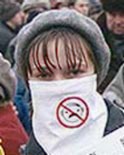 |
Vol 2, No 12
27 March 2000 |
|
|
 B E L A R U S:
B E L A R U S:
The Menace of Minsk Further unrest marks 1918 anniversary Martin D Brown Over 500 people were arrested on 25 March after riot police violently broke up a demonstration in Minsk's Jakub Kolas Square. The rally had been organised to mark the anniversary of the short-lived Belarusian Popular Republic, established in 1918. Some 5000 protestors had gathered in the square where they were met by massed ranks of police and Interior Ministry troops who then moved in to disperse the crowds at around 11:30 am. Many were beaten and arbitrarily arrested. These included several foreign observers: two deputies from the Polish Sejm, journalists from Poland, Slovakia and Russia and a representative from the Organisation for Security and Co-operation in Europe(OSCE). Belarusian opposition groups in the locality were also targeted. Predictably, Belarus's dictatorial President, Alyaksandr Lukashenka, praised the security operation. These latest demonstrations follow on from disturbances in Belarus last summer and a similar clash between protestors and police in the capital last October. President Lukashenka's decision to sign a treaty of confederation with Russia in December has also come in for mounting criticism. It was this decision in particular that motivated many to take to the streets on Saturday. Lukashenka swept to power in 1994 on a reformist ticket, promising to attack corruption and improve living standards. In the last six years, the former collective farm director has conspicuously failed to do either.
The American Department of State has recently produced a damming report on human rights abuses in Belarus, though judging by Luashenka's track record to date, it is unlikely to have any impact on his methods of governance. Martin D Brown, 25 March 2000 LINKS: BBC's Coverage of Saturday's demonstration The US State Department's critical human rights report on Belarus The Opposition Charter 97 group homepage The President's rather dated Website
|
|
![]()
Copyright ©
2000 - Central Europe Review and Internet
servis, a.s.
All Rights Reserved
 Opposition centres on the lack of democracy in the country and the increasingly violent manner in which dissenters are repressed by the regime.
Opposition centres on the lack of democracy in the country and the increasingly violent manner in which dissenters are repressed by the regime.